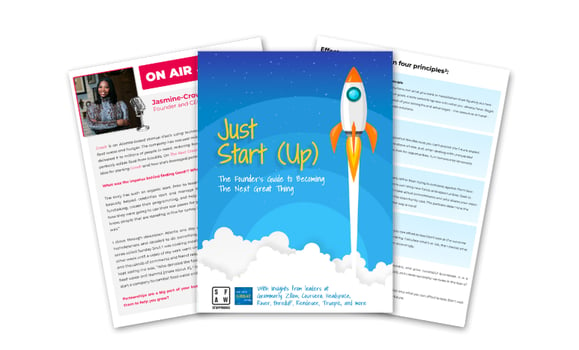Recently on The Next Great Thing podcast, I was joined by not one but three very special guests: my dog, Taco; my cat, Lily; and the Co-Founder and CEO of Rover, Aaron Easterly. Total dream line-up.
If you’re like me and you have a pet that you consider a member of the family, you probably know about – or have used – Rover. It’s the world’s largest online marketplace that connects millions of pet owners with more than half a million independent pet-sitters who will watch, walk, feed, check in on, play with, and love our dogs and cats when we can’t. But what you might not know is Rover’s founder story. It’s equal parts fascinating and inspiring. I think you’ll enjoy hearing Aaron talk about the company’s early days and growth journey as much as Taco, Lily, and I did. 🐶😸
Check out the episode on our website, Apple Podcasts, Spotify, or anywhere you listen to podcasts.
Check out all podcast episodes.
One great thing I learned: Sometimes, adding some deliberate friction into the digital experience can go a long way towards establishing credibility and trust. There’s always this massive pressure to make digital experiences more seamless, faster, and frictionless for the user. And I agree; that’s typically the right goal and approach. That orange “Buy Now” button on Amazon, for example? It’s made online shopping a breeze for millions of us (much to the chagrin of our bank accounts). Or, think about when you order an Uber. You don’t really care who’s driving the car so much as they have 4+ stars and get you from point A to point B safely and on time.
But when it comes to certain digital experiences and online marketplaces, especially ones that help you find care for your loved ones, you want more than a 5-star rating. Above all else, you want credibility and trust. That’s when building a little bit of friction into the experience can be an asset, not a liability.
I love Aaron’s term for this: constructive friction. It’s something that’s been carefully baked into Rover’s marketplace from the beginning. Aaron explains: “In the early days, we spent a lot of time thinking about how could we get smart about who will be good [petcare] providers before they even go live [on the platform]? How do we create constructive friction in the booking process so that people are more likely to have a great experience and are more likely to feel comfortable with it?”
What does constructive friction look like today at Rover? Additional hurdles to jump through in the booking process, like in-person meet-and-greets before pet sitters get hired and reviews and testimonials that must be tied to previous paid pet sitting gigs on the platform.
Yes, these extra steps add some friction to the booking and hiring process. But they’re there to help, not hinder, pet owners in finding a legit person they can trust. When you consider that more than 80% of American pet owners think of their dog or cat as a member of the family, establishing credibility and trust is essential! The same goes for people using online marketplaces to find childcare providers or someone who can care for a sick or elderly relative.
So, as you consider all the ways people can use and experience your product, service, marketplace, or software application, look for smart ways to integrate a little constructive friction. Perhaps it’s an extra step in the user journey that users will gladly take in exchange for peace of mind that their privacy, data, finances, or personal information are secure.
As Aaron advises, data analysis can help you unearth the subtleties and nuances in what users are most concerned about and what they’re looking for in the experience. It can also locate points along the user journey where building in constructive friction makes sense – both for users and the business.
How are you thinking about increasing trust and credibility? What are some of the ways you’re intentionally building points of constructive friction into the user experience?
Get a Free Copy of "Just Start(Up): The Founder's Guide to Becoming The Next Great Thing"

.png?%20White%20Bake%20Sale%20Promotion%20Facebook%20Post%20(4).png&width=290&name=Simple%20Pink%20%26%20White%20Bake%20Sale%20Promotion%20Facebook%20Post%20(4).png?%20White%20Bake%20Sale%20Promotion%20Facebook%20Post%20(4).png)
.png?width=300&name=Aaron%20Easterly%20-%20cover%20image%20(1).png)
COMMENTS